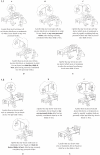How would terminally ill patients have others make decisions for them in the event of decisional incapacity? A longitudinal study
- PMID: 18031490
- PMCID: PMC2583169
- DOI: 10.1111/j.1532-5415.2007.01473.x
How would terminally ill patients have others make decisions for them in the event of decisional incapacity? A longitudinal study
Abstract
Objectives: To determine the role terminally ill patients would opt to have their loved ones and physicians play in healthcare decisions should they lose decision-making capacity and how this changes over time.
Design: Serial interviews.
Setting: The study institutions were The Johns Hopkins Medical Institutions in Baltimore, Maryland, and St. Vincent's Hospital, in New York.
Participants: One hundred forty-seven patients with cancer, amyotrophic lateral sclerosis, or heart failure, at baseline and 3 and 6 months.
Results: Patients' baseline decision control preferences varied widely, but most opted for shared decision-making, leaning slightly toward independence from their loved ones. This did not change significantly at 3 or 6 months. Fifty-seven percent opted for the same degree of decision control at 3 months as at baseline. In a generalized estimating equation model adjusted for time, more-independent decision-making was associated with college education (P=.046) and being female (P=.01), whereas more-reliant decision-making was associated with age (P<.001). Patients leaned toward more reliance upon physicians to make best-interest determinations at diagnosis but opted for physicians to decide based upon their own independent wishes (substituted judgment) over time, especially if college educated.
Conclusion: Terminally ill patients vary in how much they wish their own preferences to control decisions made on their behalf, but most would opt for shared decision-making with loved ones and physicians. Control preferences are stable over time with respect to loved ones, but as they live longer with their illnesses, patients prefer somewhat less reliance upon physicians.
Figures



Similar articles
-
When patients lack capacity: the roles that patients with terminal diagnoses would choose for their physicians and loved ones in making medical decisions.J Pain Symptom Manage. 2005 Oct;30(4):342-53. doi: 10.1016/j.jpainsymman.2005.04.010. J Pain Symptom Manage. 2005. PMID: 16256898 Free PMC article.
-
Assessing the Decision-Making Capacity of Terminally Ill Patients with Cancer.Am J Geriatr Psychiatry. 2018 May;26(5):523-531. doi: 10.1016/j.jagp.2017.11.012. Epub 2017 Dec 27. Am J Geriatr Psychiatry. 2018. PMID: 29398351 Free PMC article.
-
Beyond substituted judgment: How surrogates navigate end-of-life decision-making.J Am Geriatr Soc. 2006 Nov;54(11):1688-93. doi: 10.1111/j.1532-5415.2006.00911.x. J Am Geriatr Soc. 2006. PMID: 17087695
-
How to determine decisional capacity in critically ill patients. Presume the patient can make decisions unless proven otherwise.J Crit Illn. 1995 Mar;10(3):209-14. J Crit Illn. 1995. PMID: 10150404 Review.
-
The mental capacity act: implications for patients and doctors faced with difficult choices.Ann Acad Med Singap. 2013 Apr;42(4):200-2. Ann Acad Med Singap. 2013. PMID: 23677215 Review.
Cited by
-
Engaging in patient decision-making in multidisciplinary care for amyotrophic lateral sclerosis: the views of health professionals.Patient Prefer Adherence. 2012;6:691-701. doi: 10.2147/PPA.S36759. Epub 2012 Sep 27. Patient Prefer Adherence. 2012. PMID: 23055703 Free PMC article.
-
Patients' preferences for participation in treatment decision-making at the end of life: qualitative interviews with advanced cancer patients.PLoS One. 2014 Jun 25;9(6):e100435. doi: 10.1371/journal.pone.0100435. eCollection 2014. PLoS One. 2014. PMID: 24964036 Free PMC article.
-
Symptoms and fear in heart failure patients approaching end of life: a mixed methods study.J Clin Nurs. 2015 Nov;24(21-22):3215-23. doi: 10.1111/jocn.12973. Epub 2015 Sep 25. J Clin Nurs. 2015. PMID: 26404121 Free PMC article.
-
Experience matters: neurologists' perspectives on ALS patients' well-being.J Neurol. 2017 Apr;264(4):639-646. doi: 10.1007/s00415-016-8382-y. Epub 2017 Jan 24. J Neurol. 2017. PMID: 28120043
-
Quality of life in fatal disease: the flawed judgement of the social environment.J Neurol. 2013 Nov;260(11):2836-43. doi: 10.1007/s00415-013-7068-y. Epub 2013 Aug 30. J Neurol. 2013. PMID: 23989341
References
-
- Beauchamp TL, Childress JF. Principles of Biomedical Ethics. 5th Ed. Oxford University Press; New York: 2001. pp. 98–103.
-
- Buchanan AE, Brock D. Deciding for Others: The Ethics of Surrogate Decision Making. Cambridge University Press; New York: 1990. pp. 87–141.
-
- Sehgal A, Galbraith A, Chesney M, et al. How strictly do dialysis patients want their advance directives followed? JAMA. 1992;267:59–63. - PubMed
-
- Terry PB, Vettese M, Song J, et al. End-of-life decision making: When patients and surrogates disagree. J Clin Ethics. 1999;10:286–293. - PubMed
-
- Sulmasy DP, Terry PB, Weisman CS, et al. The accuracy of substituted judgments in patients with terminal diagnoses. Ann Intern Med. 1998;128:621–629. - PubMed
Publication types
MeSH terms
Grants and funding
LinkOut - more resources
Full Text Sources

